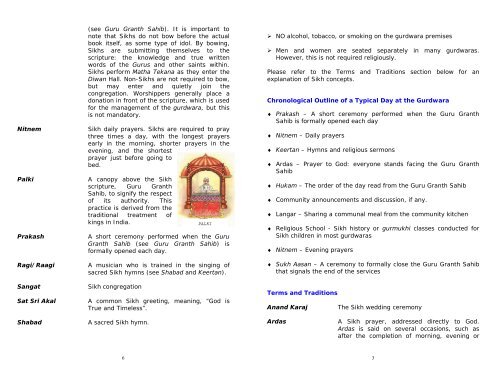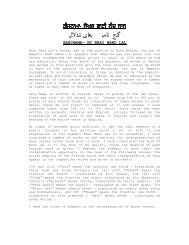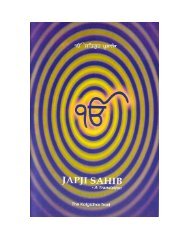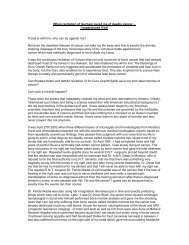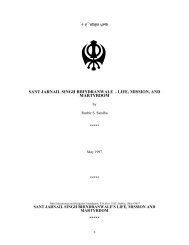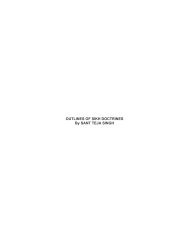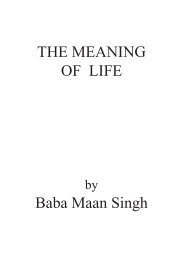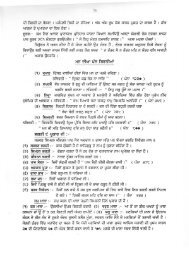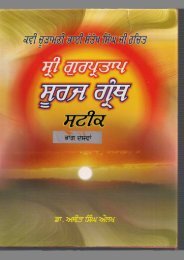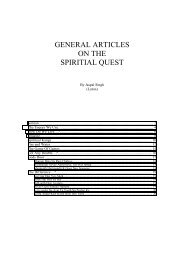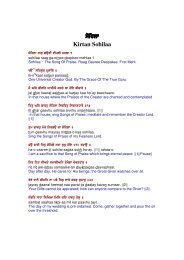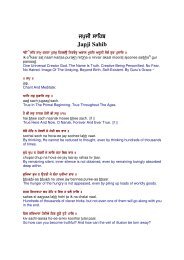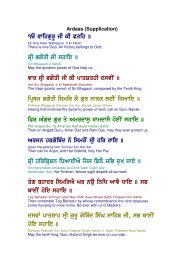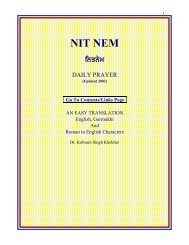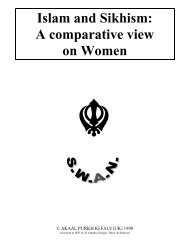The Gurdwara - Raj Karega Khalsa Network
The Gurdwara - Raj Karega Khalsa Network
The Gurdwara - Raj Karega Khalsa Network
Create successful ePaper yourself
Turn your PDF publications into a flip-book with our unique Google optimized e-Paper software.
Nitnem<br />
Palki<br />
Prakash<br />
Ragi/Raagi<br />
Sangat<br />
Sat Sri Akal<br />
(see Guru Granth Sahib). It is important to<br />
note that Sikhs do not bow before the actual<br />
book itself, as some type of idol. By bowing,<br />
Sikhs are submitting themselves to the<br />
scripture: the knowledge and true written<br />
words of the Gurus and other saints within.<br />
Sikhs perform Matha Tekana as they enter the<br />
Diwan Hall. Non-Sikhs are not required to bow,<br />
but may enter and quietly join the<br />
congregation. Worshippers generally place a<br />
donation in front of the scripture, which is used<br />
for the management of the gurdwara, but this<br />
is not mandatory.<br />
Sikh daily prayers. Sikhs are required to pray<br />
three times a day, with the longest prayers<br />
early in the morning, shorter prayers in the<br />
evening, and the shortest<br />
prayer just before going to<br />
bed.<br />
A canopy above the Sikh<br />
scripture, Guru Granth<br />
Sahib, to signify the respect<br />
of its authority. This<br />
practice is derived from the<br />
traditional treatment of<br />
kings in India.<br />
PALKI<br />
A short ceremony performed when the Guru<br />
Granth Sahib (see Guru Granth Sahib) is<br />
formally opened each day.<br />
A musician who is trained in the singing of<br />
sacred Sikh hymns (see Shabad and Keertan).<br />
Sikh congregation<br />
A common Sikh greeting, meaning, “God is<br />
True and Timeless”.<br />
‣ NO alcohol, tobacco, or smoking on the gurdwara premises<br />
‣ Men and women are seated separately in many gurdwaras.<br />
However, this is not required religiously.<br />
Please refer to the Terms and Traditions section below for an<br />
explanation of Sikh concepts.<br />
Chronological Outline of a Typical Day at the <strong>Gurdwara</strong><br />
♦ Prakash – A short ceremony performed when the Guru Granth<br />
Sahib is formally opened each day<br />
♦ Nitnem – Daily prayers<br />
♦ Keertan – Hymns and religious sermons<br />
♦ Ardas – Prayer to God: everyone stands facing the Guru Granth<br />
Sahib<br />
♦ Hukam – <strong>The</strong> order of the day read from the Guru Granth Sahib<br />
♦ Community announcements and discussion, if any.<br />
♦ Langar – Sharing a communal meal from the community kitchen<br />
♦ Religious School - Sikh history or gurmukhi classes conducted for<br />
Sikh children in most gurdwaras<br />
♦ Nitnem – Evening prayers<br />
♦ Sukh Aasan – A ceremony to formally close the Guru Granth Sahib<br />
that signals the end of the services<br />
Terms and Traditions<br />
Anand Karaj<br />
<strong>The</strong> Sikh wedding ceremony<br />
Shabad<br />
A sacred Sikh hymn.<br />
Ardas<br />
A Sikh prayer, addressed directly to God.<br />
Ardas is said on several occasions, such as<br />
after the completion of morning, evening or<br />
6<br />
3


